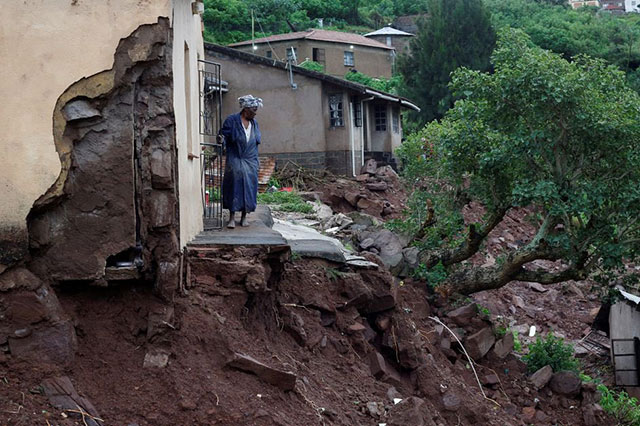Durban – South Africa’s government on Tuesday sought to reassure a worried public about efforts to help the east coast, where millions remained without water more than a week after deadly storms pounded the region.
Following up a declaration of a national state of disaster, President Cyril Ramaphosa dispatched top ministers to the city of Durban and KwaZulu-Natal (KZN) province, where at least 448 people have now died and 40 000 are homeless.
“These floods are the worst floods that we have ever seen in living memory,” Nkosazana Dlamini-Zuma, the minister in charge of disaster management, told a news conference.
More than 600 schools were damaged by the floods, with 101 rendered inaccessible.
“Literally, the only thing you can find is teachers and pupils. Material is completely gone,” said Education Minister Angie Motshekga after inspecting damage at some schools in Durban, estimating the damage at 442 million rand ($30 million).
ALSO READ | WATCH | #KZNFloods: Residents block and loot Shoprite grocery truck in Durban
Health Minister Joe Phaahla visited the Prince Mshiyeni regional hospital, where for the past week, patients have used buckets to bathe and flush toilets.
“The main challenge there is water,” he told AFP, adding cisterns were bing repaired to store water delivered by tankers.
Normally the hospital sees 2 000 patients a day.
About 100 residents of the devastated Umlazi neighbourhood waited outside the hospital, fearful that their medical records had been lost in the storm.
Several hospitals reported that files had been lost or damaged, raising fears among patients with chronic conditions.
ALSO READ | Death toll nears 400 in KZN floods as rescuers search for missing
Pravin Gordhan, the minister for public enterprises, said the Durban shipping terminal, the second-largest container port in Africa, was fully functional on Tuesday.
During the height of the floods last week, containers were tossed about like building blocks.
The 8 000 to 9 000 shipping containers that had been backlogged because of a damaged access road, would be cleared within a week, he said.
Key roads connecting the port to the rest of the country sustained heavy damage, creating bottlenecks for around 13,000 truckers who daily have to get goods to and from the port, serving a vast stretch of Africa as far as the Democratic Republic of Congo.
Graft fears
Helicopters flew low across the city, searching for dozens of people still missing. Five more bodies were recovered Tuesday.
Along roadsides, residents dragged mattresses and other possessions into a welcome day of sunshine, trying to dry out whatever possessions they could salvage.
Some 10 000 troops were being deployed to assist, both with air support for search efforts and relief operations, but also with engineering, plumbing and electrical support to try to get basic services running.
But for residents like Uber-driver Olona Ngcobo, 26, from Umlazi township, who lost his house, the army help is coming too late.
“I don’t understand why they waited this long to send the army, they should’ve been sent on the second day of the floods. What’s the use now? To find dead bodies?” said a despondent Ngcobo.
ALSO READ | Crocs swept away by KZN floods recaptured
Many in South African are wary of the government efforts, recalling the recent experience of emergency funds that were looted or misspent at the height of the Covid-19 pandemic.
“Experience has clearly shown the vulnerability of our procurement systems to corruption in times of crisis, if one considers the rampant corruption during the Covid-19 pandemic,” said Karam Singh, head of the non-profit Corruption Watch.
“There must be absolute transparency and full disclosure of how these funds are being distributed, ensuring that they reach the communities for whom they are intended,” he added.
Unemployed Percy Mbanjwa, who lost his house in the Inanda area, is not convinced the promised relief funds will all make it to the intended beneficiaries like him.
“I know they will chow (slang for spend) the money. I just hope they will have conscience this time to help the people first, that’s all we can hope for,” said Mbanjwa.
Seeking to pre-empt such concerns, Ramaphosa announced a new oversight body comprising the auditor-general, business and religious leaders, as well as professional groups of engineers and accountants.
Follow African Insider on Facebook, Twitter and Instagram
Source: AFP
Picture: Twitter/@moabelo_tshepo
For more African news, visit Africaninsider.com


